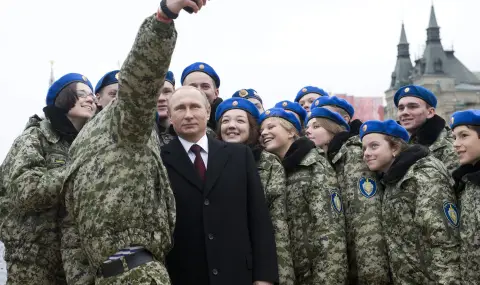They sing the determination "to serve Russia, even if the path is difficult" - this is the anthem of the Russian national-patriotic movement "Yunarmiya", which educates the children and youth of Russia in patriotism and prepares them for military service. Meanwhile, it is already doing this outside the country's borders - in the occupied territories of Ukraine, writes ARD.
Officially, the groups of "Yunarmiya" cover children from eight years of age and up, but reports on Russian television channels show that they even accept children from kindergarten, the German public-law media outlet adds.
The members of the movement wear bright red shirts and berets with an eagle's head and a five-pointed star on them. The young people regularly write letters to Russian soldiers, organize aid collections and prepare for military service by learning to disassemble and assemble machine guns.
The role of youth camps
In its documents, “Yunarmiya“ boasts of its support for the war against Ukraine. Its members have written over three million letters to Russian soldiers and sent nearly 80,000 video greetings. In addition, members of the movement regularly visited wounded Russian servicemen in hospitals.
The mandatory program of “Yunarmiya“ and its similar organizations includes attending youth camps, and the corresponding infrastructure has already been built in the annexed Ukrainian regions. Formally, there is talk of an “offer“ to Ukrainian children - but in practice they cannot refuse participation in these camps. There they are taught patriotism, study the geography and history of Russia and undergo military training, ARD explains.
Young people should be directed to the army early
“Yunarmiya“ was created in 2016 at the initiative of the then Minister of Defense Sergei Shoigu. The organization's task is to strengthen Russia's dominance and support its military efforts, says Stefan Meister of the German Foreign Policy Association.
This also facilitates the recruitment of new soldiers - not only for the current war in Ukraine, but also for future conflicts, writes ARD. Documents of the "Youth Army" state, for example, that the movement aims to increase the number of members who can join the army.
Nine years after its founding, the "Youth Army" has 1.3 million members - according to the organization's website. However, other documents of the organization speak of as many as 1.7 million members, and the state finances this and other similar organizations with billions of rubles. According to Meister, this case is about “patriotic education in the name of Russia and the education of an army of loyal young people, who can then be used for military purposes“.
Because of its support for the war against Ukraine and the propaganda it spreads, “Yunarmiya“ is subject to sanctions by the EU and some individual countries.
Ukrainians to become “new Russians“
In the occupied regions of Ukraine, the emphasis in the work of “Yunarmiya“ is the patriotic re-education of Ukrainian children, ARD explains. “It is about taking away their Ukrainian identity and using them as a tool to influence their parents“, says Yuri Sobolevsky from the Kherson City Council. According to him, Russia's goal is clear: an entire generation of Ukrainians must be transformed into "new adaptable Russians."
In its November document, "Youth Army" states that 16,579 young people from the occupied regions of Donetsk, Luhansk, Zaporizhia and Kherson have so far enrolled in the organization.
At the same time, "Youth Army" is just one of the Kremlin's many attempts to indoctrinate Ukrainian children and break Ukrainian identity in the conquered territories, ARD notes. Another example is the sending of Ukrainian orphans to Russia, where they are given up for adoption. Their exact number is not established, but according to estimates by the Ukrainian government and non-governmental organizations, it is about 20,000 children.
How is the re-education carried out?
According to Dmytro Lubynets, the Ukrainian parliament's human rights commissioner, the number of children in the occupied territories is about 1.5 million. School education plays an important role in strengthening Russian dominance in these areas. In June, the human rights organization “Human Rights Watch“ reported on the indoctrination carried out in schools - through the introduction of Russian curricula, teaching in Russian, and the imposition of anti-Ukrainian propaganda. In doing so, the Russian occupiers are violating international law.
ARD also gives specific examples of how the “brainwashing” is carried out: in the occupied Kherson region, students are forced to watch films about the successes and “good consequences of the special military operation”; in Melitopol, their children are taught about the “heroism” of the soldiers.
“Amnesty International”, for its part, points out that teachers in the occupied territories are under enormous pressure to return to schools and implement Russian curricula there. Anyone who resists is subject to serious threats. For many, the only salvation is escape, writes ARD.
Generation under Russian influence
With the re-education of Ukrainian children and their transformation into “loyal patriotic Russians” Russia is trying to send a message to the people in the occupied territories and to its own population, Stefan Meister told the German public-law media. People must accept the idea that Ukraine "does not have its own identity and statehood."
In doing so, Russia is not wasting any time. There is already a generation of Ukrainians who have grown up under Russian occupation and school indoctrination - in Crimea and the Donbas. For these children, Russian stories have become their only reality and are decisive for their understanding of history, identity and truth.
Authors: Anna Chaika ARD | Eckart Aretz ARD
